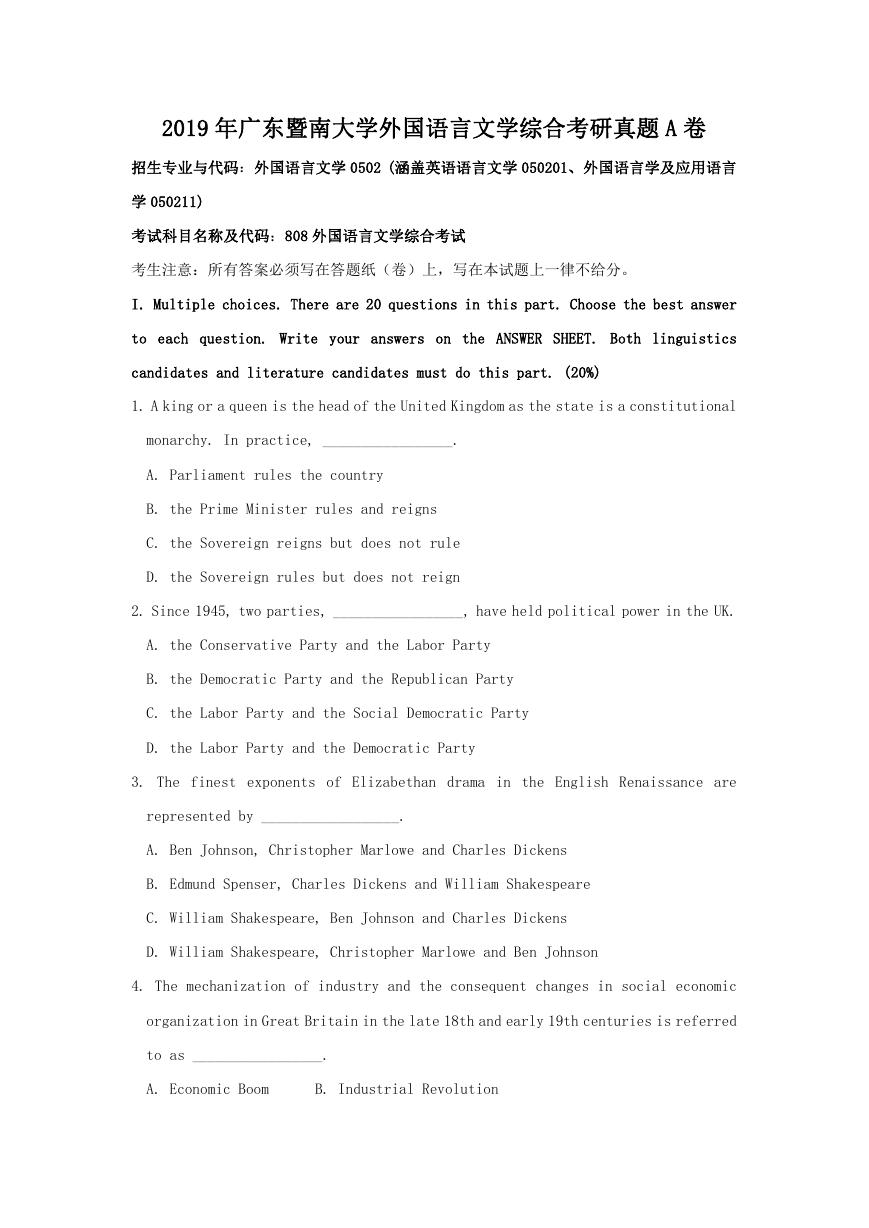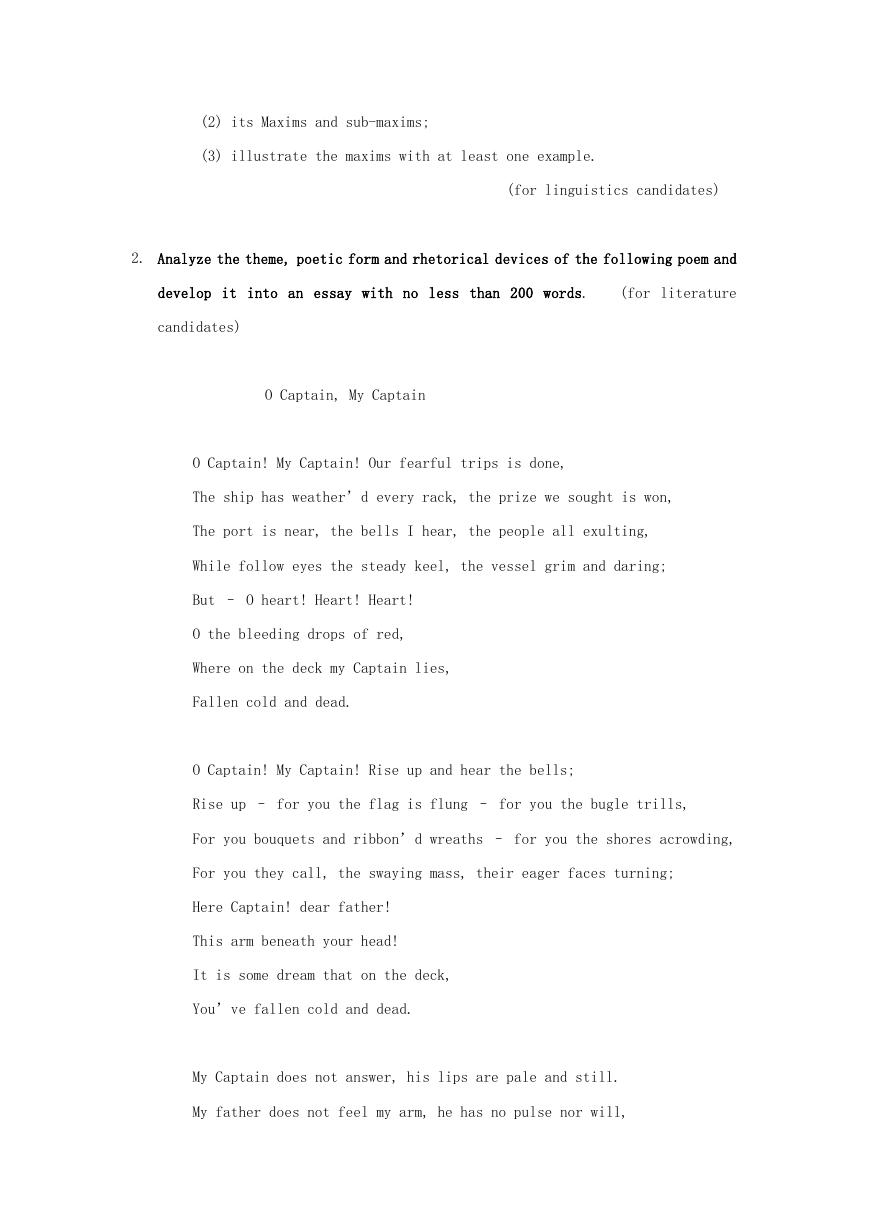2019 年广东暨南大学外国语言文学综合考研真题 A 卷
招生专业与代码:外国语言文学 0502 (涵盖英语语言文学 050201、外国语言学及应用语言
学 050211)
考试科目名称及代码:808 外国语言文学综合考试
考生注意:所有答案必须写在答题纸(卷)上,写在本试题上一律不给分。
I. Multiple choices. There are 20 questions in this part. Choose the best answer
to each question. Write your answers on the ANSWER SHEET. Both linguistics
candidates and literature candidates must do this part. (20%)
1. A king or a queen is the head of the United Kingdom as the state is a constitutional
monarchy. In practice, _________________.
A. Parliament rules the country
B. the Prime Minister rules and reigns
C. the Sovereign reigns but does not rule
D. the Sovereign rules but does not reign
2. Since 1945, two parties, _________________, have held political power in the UK.
A. the Conservative Party and the Labor Party
B. the Democratic Party and the Republican Party
C. the Labor Party and the Social Democratic Party
D. the Labor Party and the Democratic Party
3. The finest exponents of Elizabethan drama in the English Renaissance are
represented by __________________.
A. Ben Johnson, Christopher Marlowe and Charles Dickens
B. Edmund Spenser, Charles Dickens and William Shakespeare
C. William Shakespeare, Ben Johnson and Charles Dickens
D. William Shakespeare, Christopher Marlowe and Ben Johnson
4. The mechanization of industry and the consequent changes in social economic
organization in Great Britain in the late 18th and early 19th centuries is referred
to as _________________.
A. Economic Boom
B. Industrial Revolution
�
C. Glorious Revolution
D. Urbanization
5. In the UK, children from the age of 5 to 16 _________________.
A. receive completely free education
B. receive partly free education
C. do not receive free education at all
D. do not receive free education if their parents are rich
6. Discovery of law of the universal gravitation by _________________ is the most
important of all his achievements in physics.
A. Kepler
B. Isaac Newton
C. Galileo
D. Copernicus
7. The earliest settlers in America first found and took over the parts of
_________________.
A. The Appalachians and their foothills
B. The Atlantic and Gulf Coastal Plain
C. The interior lowlands
D. The Cordillera
8. _________________ guaranteed the blacks and other races in the U.S. the right
to vote.
A. Emancipation Proclamation in 1863
B. The Thirteenth Amendment to the Constitution in 1865
C. The Civil Rights Act of 1964
D. The Voting Rights Act of 1965
9. In early 19th century, _________________was the center of American writing.
A. Boston
B. Chicago
C. Philadelphia
D. New York City
10. _________________ is the most important and largest river in the United States
of America.
A. The Colorado River
B. The Mississippi River
C. The Missouri River
D. The Ohio River
11. In the United States of America, Constitutional Amendment can go into effect
after it is approved by _________________.
A. two thirds of both houses
B. three fourths of the states
C. two thirds of the states
D. half of the states
12. _________________ is not the major newspaper or magazine in the U. S.
�
A. Financial Times
B. New York Times
C. Washington Post
D. National Geography
.
13. Canada consists of _________________ geographical regions.
A. three
B. four
C. five
D. six
14. Maples always symbolize _________________.
A. America
B. Australia
C. Canada
D. England
15. English and _________________ are the official languages in Canada.
A. French
B. German
C. Portuguese
D. Spanish
16. The important economy in Canada’s Atlantic provinces is _________________ since
there are rich green mountains and valleys in these regions.
A. agriculture
B. forestry trade
C. textile business
D. tourist trade
17. Australia locates between _________________ and Indian Ocean.
A. the Arctic
B. the Atlantic
C. the North Sea
D. Pacific Ocean
18. _________________ is the sunniest city in Australia.
A. Adelaide
B. Darwin
C. Melbourne
D. Sydney
19. _________________ is not one of the major exports of New Zealand.
A. Dairy
B. Fish
C. Oil
D. Wool
20. The Republic of Ireland declared its independence in _________________.
A. 1918
B. 1931
C. 1945
D. 1949
II. Fill in the blanks with proper answers. Write your answers on the ANSWER SHEET.
Both linguistics candidates and literature candidates must do this part. (20%)
1. The description of a language as it changes through time is a _________________
study in linguistics.
2. The relationship between words and what they represent is generally
_________________.
3. _________________ are produced by obstructing the flow of air as it passes from
the lungs through the vocal tract and out through the mouth or nose.
4. The different phones which can represent a phoneme in different phonetic
environments are called the _________________ of that phoneme.
5. Words are not the only linguistic units to carry _________________ meaning.
�
Sentences refer to actions, states, and events in the world as well.
6. Syntactic movement is dictated by rules traditionally called _________________
rules.
7. The fundamental function of every language system is to link meaning and
expression—to provide _________________ expression for thought and feeling.
8. When a word has two or more related meanings, it is a _________________.
9. According to Searle, those illocutionary acts whose points are to commit the
speaker to some future course of action are called _________________.
10. A _________________ sentence, often called a clause, contains a verb and, at
a minimum, any other expressions required by the verb as part of its structural
characteristics.
11. ____________ refers to a contrast or an incongruity between what is stated and
what is really meant, or between what is expected to happen and what actually
happens.
12. English Romanticism began in 1798 with the publication of ______________.
13. “If Winter comes, can Spring be far behind!” is an epigrammatic line by
_____________.
14. Marcel Proust, James Joyce and Virginia Woolf are the representative writers
of the ___________.
15. The sub-title of Vanity Fair is ___________. The writer’s intention was not
to portray individuals, but the bourgeois and aristocratic society as a whole.
16. ___________’s poetry is unique and unconventional in its own way. Her poems
have no titles, hence are always quoted by their first lines.
17. The most original playwright of the Theatre of Absurd is Samuel Beckett and his
first play, _______________, is regarded as the most famous and influential play
of the Theater of Absurd.
18. The literary spokesman of the Jazz Age is often thought to be ______________.
19. The period from 1865-1914 has been referred to as ____________in the literary
history of the United States.
20. In his poems, Walt Whitman is innovative in the terms of the form of his poetry,
�
which is called “_____________”.
III. Write your answers on the ANSWER SHEET. Both linguistics candidates and
literature candidates must do this part. (10%)
Section A: Decide whether each of the following statements is True or False. If
it is true, write T and if it is false, write F.
1. Grammar is a system of elements and patterns that organizes linguistic expression.
2. Speech and writing came into being at much the same time in human history.
3. Category refers to a group of linguistic items which fulfill the same or similar
functions in a particular language such as a sentence, a noun phrase or a verb.
4. Sometimes languages use different scripts for same purposes.
5. When two phonetically similar sounds occur in the same environments and they
distinguish meaning, they are regarded as complementary distribution.
Section B: Give the author’s name and indicate the genre of the following works.
6. The Merchant of Venice
7. “A Rose for Emily”
8. The Adventure of Huckleberry Finn
9. “I Wandered Lonely As a Cloud”
10. “Ode to a Nightingale”
IV. Choose SIX from the following terms and explain them briefly. Write your answers
on the ANSWER SHEET. (30%)
1. tone
2. open class words
3. major lexical categories of English language
4. sense
5. speech community
6. cultural overlap
7. epic
�
8. sentimentalism
9. the Lost Generation
10. heroic couplet
11. Lake poets
12. point of view
V. Answer the following questions: Section A for linguistics candidates and Section
B for literature candidates. Write your answers on the ANSWER SHEET. (40%)
Section A:
1. What can be the differences between the macro-sociolinguistics and the
micro-sociolinguistics?
2. According to Halliday’s register theory, what are the three social variables
that determine a register?
3. What are the strong and weak versions of Sapir-Whorf Hypothesis?
4. What is children’s atypical development of language acquisition?
Section B:
5. Based on TheOldManandtheSea, discuss the themes and writing style of Ernest
Hemingway’s novels.
6. Discuss the theme of the poem “The Waste Land” by Thomas Stearns Eliot and
comment on its importance in the history of American literature.
7. Comment on the main characteristics of Romanticism.
8. Make a comment on the character of Jane Eyre, the heroine of the novel Jane
Eyre by Charlotte Bronte.
VI. Choose ONE of the following questions and write your answer on the ANSWER SHEET.
(30%)
1. Please state Paul Grice’s
(1) Conversational Cooperative Principle;
�
(2) its Maxims and sub-maxims;
(3) illustrate the maxims with at least one example.
(for linguistics candidates)
2. Analyze the theme, poetic form and rhetorical devices of the following poem and
develop it into an essay with no less than 200 words.
(for literature
candidates)
O Captain, My Captain
O Captain! My Captain! Our fearful trips is done,
The ship has weather’d every rack, the prize we sought is won,
The port is near, the bells I hear, the people all exulting,
While follow eyes the steady keel, the vessel grim and daring;
But – O heart! Heart! Heart!
O the bleeding drops of red,
Where on the deck my Captain lies,
Fallen cold and dead.
O Captain! My Captain! Rise up and hear the bells;
Rise up – for you the flag is flung – for you the bugle trills,
For you bouquets and ribbon’d wreaths – for you the shores acrowding,
For you they call, the swaying mass, their eager faces turning;
Here Captain! dear father!
This arm beneath your head!
It is some dream that on the deck,
You’ve fallen cold and dead.
My Captain does not answer, his lips are pale and still.
My father does not feel my arm, he has no pulse nor will,
�
The ship is anchor’d safe and sound, its voyage closed and done,
Form fearful trip the victor ship comes in with object won;
Exult, O shores, and ring, O bells!
But I, with mournful tread,
Walk the deck my Captain lies,
Fallen cold and dead
�
















 2023年江西萍乡中考道德与法治真题及答案.doc
2023年江西萍乡中考道德与法治真题及答案.doc 2012年重庆南川中考生物真题及答案.doc
2012年重庆南川中考生物真题及答案.doc 2013年江西师范大学地理学综合及文艺理论基础考研真题.doc
2013年江西师范大学地理学综合及文艺理论基础考研真题.doc 2020年四川甘孜小升初语文真题及答案I卷.doc
2020年四川甘孜小升初语文真题及答案I卷.doc 2020年注册岩土工程师专业基础考试真题及答案.doc
2020年注册岩土工程师专业基础考试真题及答案.doc 2023-2024学年福建省厦门市九年级上学期数学月考试题及答案.doc
2023-2024学年福建省厦门市九年级上学期数学月考试题及答案.doc 2021-2022学年辽宁省沈阳市大东区九年级上学期语文期末试题及答案.doc
2021-2022学年辽宁省沈阳市大东区九年级上学期语文期末试题及答案.doc 2022-2023学年北京东城区初三第一学期物理期末试卷及答案.doc
2022-2023学年北京东城区初三第一学期物理期末试卷及答案.doc 2018上半年江西教师资格初中地理学科知识与教学能力真题及答案.doc
2018上半年江西教师资格初中地理学科知识与教学能力真题及答案.doc 2012年河北国家公务员申论考试真题及答案-省级.doc
2012年河北国家公务员申论考试真题及答案-省级.doc 2020-2021学年江苏省扬州市江都区邵樊片九年级上学期数学第一次质量检测试题及答案.doc
2020-2021学年江苏省扬州市江都区邵樊片九年级上学期数学第一次质量检测试题及答案.doc 2022下半年黑龙江教师资格证中学综合素质真题及答案.doc
2022下半年黑龙江教师资格证中学综合素质真题及答案.doc